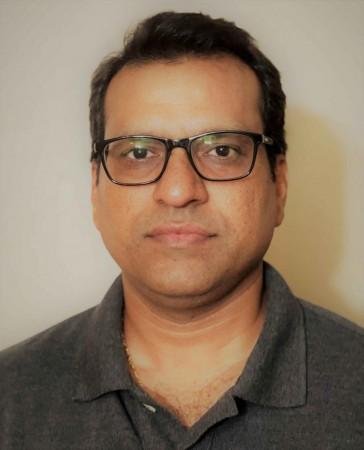
Companies are taking a new approach with their data; systems engineer Kiran Jewargi ensures the technical infrastructure is ready for the future.
Businesses run on technology, that's simply the reality. Whether serving the healthcare industry, retail industry, or utility industry, organizations need seamless data storage, streamlined disaster recovery processes, backup solutions, multi-cloud solutions, and more. All that technology requires extensive expertise and Kiran Jewargi has spent his 22-year career becoming an expert systems engineer, serving organizations of all types and sizes.
Since 2019, Kiran has worked at Dell Technologies as an advisory systems engineer. His role is critical to the function of the entire company, and his job responsibilities would make a non-technical person scratch their head. But to Kiran, systems engineering has been his expertise for as long as he can remember; he has seen the evolution of on-prem and private cloud infrastructure, multi-cloud and hybrid cloud solutions, the refinement of next-generation data centers, and the technical requirements of digital transformation efforts. Though all of this sounds "back-end," Kiran directly impacts functions like sales, finance, operations, and marketing, requiring a deep understanding of business acumen and organizational goals.
One of Kiran's major job components at Dell is providing technical leadership to the sales team by ensuring the technology available enables specific account penetration strategies and account-specific sales plans. These specifications require Kiran to be an expert in data storage solutions on the market and outline exactly what it would take for Dell to adopt these technologies and then build the infrastructure to bring them to life.
Prior to Dell, Kiran worked in a range of organizations, constantly challenged by new industries and tackling projects with a range of goals. In the healthcare sector, Kiran was tasked with improving the performance of a data center that partnered with the EPIC EMR system to access, organize, store and share electronic patient records. The current system was slow and had astronomical maintenance costs. The organization, Washington Healthcare, wanted to improve efficiencies, reduce its total cost of ownership, cut back on capital expenditures, and make patient records easily available in case of disaster.
Kiran got to work designing a solution that consolidated three data centers into two data centers, carving out an annual savings of $250,000 by reducing space and power cooling needs. The solution was equipped with high-end, enterprise-grade, all-flash storage for the EPIC application. The implementation had to abide by patient record storage and regulatory requirements. Kiran also designed a disaster recovery methodology strategy for critical EMR systems. This new solution improved the EPIC EMR system's performance, resiliency, and reliability. The savings surrounding maintenance, data migrations, backups, and more was upwards of $450,000 per year and the application performance increased by 200%. These technical improvements had incredible implications for the business and greatly improved customer experience, too.
Today, many business challenges rely on technology to address them. More and more, systems engineers like Kiran are required to be able to apply technology to real-world situations. For some in the technical space, this juncture can be difficult; explaining technical processes in non-technical terms, figuring out how to understand business operations, and acting as a strategic partner is not an inherent skill that systems engineers have, but it is one that they have to learn. Kiran has become an expert, proving himself in different business models, leading a multitude of development teams, and running strategic projects simultaneously.
Trained formally at Datte Meghe College of Engineering, Kiran has a degree in Industrial Electronics Technology. While this formal education helped launch Kiran's career, his success is dedicated entirely to his own hard work, unique capabilities, and technical curiosity. Kiran has worked with a variety of enterprise data storage technologies such as SCM, QLC, SSD, and HDD solutions. He knows his way around on-prem infrastructure, private cloud solutions, multi-cloud/hybrid solutions, and next-generation data centers.
As an industry leader, Kiran is committed to improving his own skill set and helping others in the field navigate their own careers. In his spare time, he authors technical papers trains up-and-coming engineers, and participates in a multitude of research organizations, including the Scholars Academic and Scientific Society. Kiran is certified in Microsoft Azure, Dell Cloud Technology, and Hitachi Solution Architecture.
Systems engineers who are just entering the field should look to Kiran as an example of how to mold their careers and position themselves as more than "just an engineer." He has successfully positioned himself as a multi-dimensional business leader in many different environments. With impressive grit and tenacity, Kiran is paving the future path for how technical resources are seen within their organizations.


!['Had denied Housefull franchise as they wanted me to wear a bikini': Tia Bajpai on turning down bold scripts [Exclusive] 'Had denied Housefull franchise as they wanted me to wear a bikini': Tia Bajpai on turning down bold scripts [Exclusive]](https://data1.ibtimes.co.in/en/full/806605/had-denied-housefull-franchise-they-wanted-me-wear-bikini-tia-bajpai-turning-down-bold.png?w=220&h=135&l=50&t=40)


!['Had denied Housefull franchise as they wanted me to wear a bikini': Tia Bajpai on turning down bold scripts [Exclusive]](https://data1.ibtimes.co.in/en/full/806605/had-denied-housefull-franchise-they-wanted-me-wear-bikini-tia-bajpai-turning-down-bold.png?w=220&h=135)


![Nayanthara and Dhanush ignore each other as they attend wedding amid feud over Nayanthara's Netflix documentary row [Watch]](https://data1.ibtimes.co.in/en/full/806599/nayanthara-dhanush-ignore-each-other-they-attend-wedding-amid-feud-over-nayantharas-netflix.jpg?w=220&h=135)